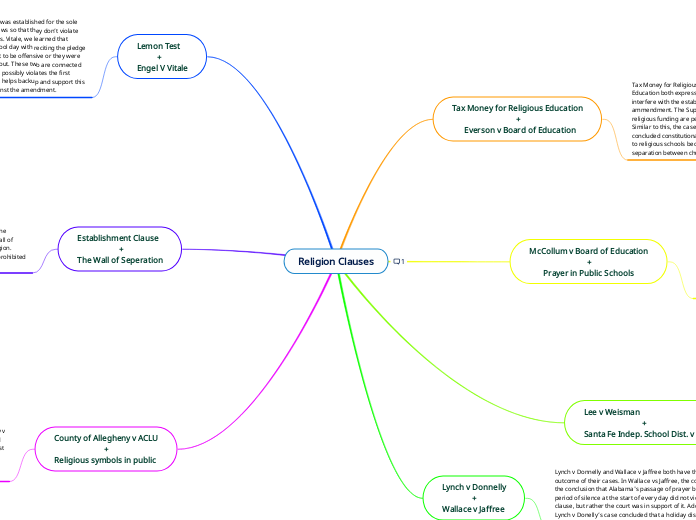Religion Clauses
Tax Money for Religious Education
+
Everson v Board of Education
Tax Money for Religious Education and Everson v Board of Education both express that both of their cases do not interfere with the establishment clause of the first ammendment. The Supreme court stated that vouchers for religious funding are permitted under the first amendment. Similar to this, the case of Everson v Board of Education was concluded constitutional in allowing taxpayer funds to bus kids to religious schools because it did not breach the wall of separation between church and state.
McCollum v Board of Education
+
Prayer in Public Schools
McCollum v Board of Education and Prayer in Public Schools are connected because they both suggest that prayer and religious practice in school is in violation of the first amendment. These both preach the same idea that it goes against the first amendment because we learned that this amendment is about the freedom to practice your own religion. However, by practicing religion and prayer in schools this goes against this freedom and the students desires.
Lee v Weisman
+
Santa Fe Indep. School Dist. v Doe
Lee v Weisman concluded that Rhode Island public school bringing a rabbi to a graduation ceremony was in violation of the amendment. Similar to this, Santa Fe Indep. School Dist. v Doe was ruled that reciting prayers at the beginning of their football games was also unconstitutional. As one can see in both of these schools, their actions upon their school events and activities were both ruled as not in favor of the establishment clause.
Lynch v Donnelly
+
Wallace v Jaffree
Lynch v Donnelly and Wallace v Jaffree both have the same outcome of their cases. In Wallace vs Jaffree, the court came to the conclusion that Alabama's passage of prayer being one period of silence at the start of every day did not violate this clause, but rather the court was in support of it. Additionally, Lynch v Donelly’s case concluded that a holiday display and creche are not in violation of the amendment as well.
Lemon Test
+
Engel V Vitale
We learned that the lemon test was established for the sole purpose of evaluating certain laws so that they don’t violate the first amendment. In Engel vs. Vitale, we learned that students were to start their school day with reciting the pledge of allegiance, but if they found it to be offensive or they were not comfortable they could opt out. These two are connected because here we see a law that possibly violates the first amendment and the lemon test helps backup and support this in determining if it does go against the amendment.
Establishment Clause
+
The Wall of Seperation
We learned that the Establishment Clause prevents the establishment of religion by congress and that the Wall of separation has no government involvement with religion. These both enforce the idea that the government is prohibited from establishing religion.
County of Allegheny v ACLU
+
Religious symbols in public
County of Allegheny v ACLU and Religious symbols in public both express similar ideas. We see in the County of Allegheny v ACLU that the creche with a written saying that was displayed on a grand staircase of the county courthouse violated the first amendment. This also stands with the idea of religious symbols in public, being that these also go against the establishment clause.
